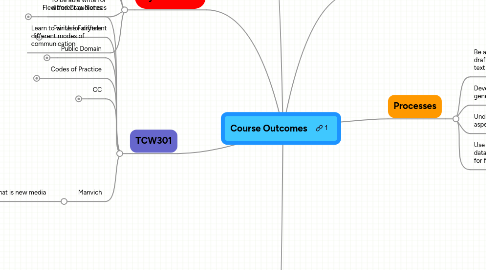
1. Critical Thinking, Reading, and Writing
1.1. Use information, writing, and reading for inquiry, learning, thinking, and communicating
1.2. Integrate previously held beliefs, assumptions, and knowledge with new information and the ideas of others to accomplish a specific purpose within a context
2. Knowledge of Conventions
2.1. Learn common formats for different genres
2.2. Develop knowledge of genre conventions ranging from structure and paragraphing to tone and mechanics
2.3. Understand and apply legal and ethical uses of information and technology including copyright and intellectual property
3. My Outcomes
3.1. Learn to write more confidently
3.2. To be able to revise my work more effectively
3.3. To be able write for different audiences
3.4. Learn to write for different different modes of communication
4. TCW301
4.1. Flew and Crap Notes
4.1.1. http://www.mindmeister.com/maps/show/77361705
4.2. Fair Use Fairytale
4.2.1. Copyright is protecting intellectual property
4.2.2. About protecting the creator
4.2.3. Copyright only last only 14 years. but that excludes disney
4.2.4. after that time the property falls into the public domain
4.2.5. a small amount of material can be borrowed without paying
4.2.6. such as the video it doesn't break copyright because it does not change original work
4.3. Public Domain
4.3.1. The Public Domain is the rule, copyright protection is the exception.
4.3.2. Copyright protection should last only as long as necessary to achieve a reasonable compromise between protecting and rewarding the author for his intellectual labour and safeguarding the public interest in the dissemination of culture and knowledge
4.3.3. What is in the Public Domain must remain in the Public Domain
4.3.4. The lawful user of a digital copy of a Public Domain work should be free to (re-)use, copy and modify such work
4.3.5. Contracts or technical protection measures that restrict access to and re-use of Public Domain works must not be enforced.
4.4. Codes of Practice
4.4.1. Archived material should be clearly marked as to its source, and (wherever possible) metadata associated with that material should be preserved.
4.4.2. Scholars who wish to open their collections of archived material to others should adopt policies appropriate to the medium, aimed at limiting access to scholars doing research in the relevant area and establishing appropriate limitations on the purposes to which the materials will be put.
4.4.3. Material archived in reliance on fair use should be intended only for scholarly use
4.4.4. archiving activities may be justified under express and implied licenses
4.4.5. provide citations
4.4.6. amount used should correspond to the research purpos
4.5. CC
4.5.1. digi tools foster creation distribution and use
4.5.2. A place to share to and take ideas
4.5.3. there are many sites that share in the ideals of fair use
4.6. Manvich
4.6.1. what is new media
4.6.1.1. numerical representation
4.6.1.1.1. formally mathmatic
4.6.1.1.2. algorithmic muniplation
4.6.1.2. modular
4.6.1.2.1. fractal structure
4.6.1.2.2. structual
4.6.1.3. automation
4.6.1.3.1. computer runs system
4.6.1.3.2. artificial intelligence and life
4.6.1.4. varibility
4.6.1.4.1. can exist in several forms
4.6.1.4.2. customation
4.6.1.5. transcoding
